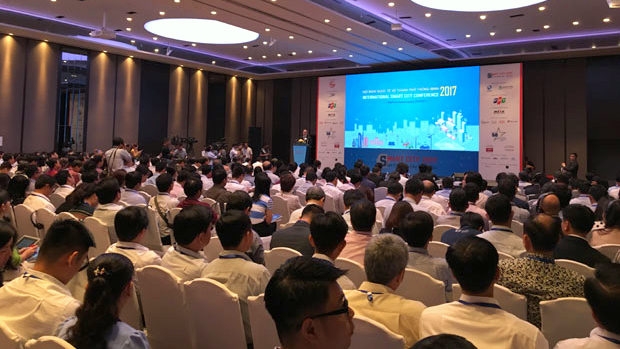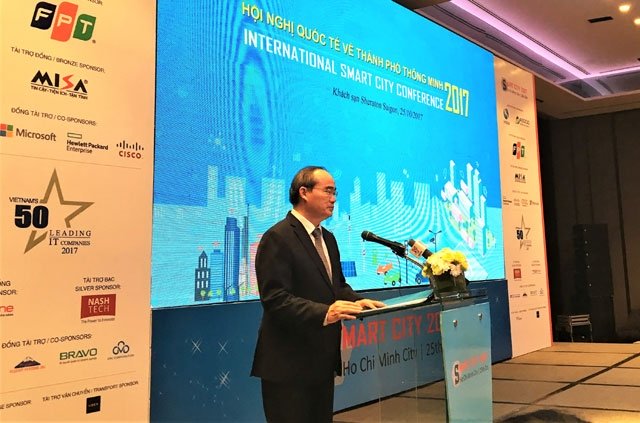|
The conference attracted over 500 delegates and local authorities from 31 provinces and cities, alongside IT experts. (Credit: NDO) |
|
Hosted by the city’s Department of Information and Communications, in collaboration with Vietnam Software and IT Services Association (VINASA) and Asian-Oceanian Computing Industry Organisation (ASOCIO), the Smart City 2017 event aims to share visions, strategies and experience on smart urban construction, while delivering smart urban development solutions and planning based on advanced technologies, such as IoT and Big Data.
Speaking at the opening, Politburo member Nguyen Thien Nhan, who is also Secretary of the Ho Chi Minh City Party Committee, said that the southern economic hub has a lot of favourable conditions to develop in the future but also faces challenges, such as unstable competitiveness, inadequate infrastructure, limited resources for socio-economic development, and untapped potential in regional links and international integration. In that context, in 2016, the city leaders identified the intelligent urban organisation as an effective development solution.
Giving evidence that a number of countries and cities in the world are deploying smart urban construction under differing conditions, of which Singapore with a per capita income of approximately US$50,000 per year or India at over US$2,000 per year are all deploying smart urban construction, Nhan stated that Ho Chi Minh City, as well as other cities in Vietnam, such as Hanoi, Can Tho, Da Nang, Quang Ninh and Binh Duong, can now develop a project to become smart urban areas.
Ho Chi Minh City determines intelligent urban construction based on four entities, including the government, enterprises, people and social organisations. The city will focus on implementing "two wing" strategies during the smart urban construction process: smart urban planning for sustainable development and management-smart and citizens-smart businesses.
Drawing from international experience, Nhan stated that the city identifies four basic solutions for its smart development, including building urban authorities with long-term development strategies; the government lending support to the above four subjects in order to determine the effectiveness of a development model; strongly developing telecommunication infrastructure so that cyberspace becomes the living space of all people; and citizens are the subject of intelligent urban development.
Secretary of the Ho Chi Minh City Party Committee Nguyen Thien Nhan speaks at the opening. (Credit: NDO)
Delegates at the event argued that with the huge rural-to-urban migration waves nowadays, city leaders, not only in Vietnam but around the world, are urgently seeking solutions to address the challenges posed by rising population pressures, such as traffic jams, environmental pollution, unstable security and order, and inadequate infrastructure. With the outbreak of the 4th Industrial Revolution, the smart urbanisation trend has become an indispensable development for cities, especially large cities with fast-growing urbanisation in the world, as well as in Vietnam, such as Ho Chi Minh City.
The conference focused on three main topics: smart cities and the vision of cities’ leaders; IoT platforms for smart cities and intelligent cities' digital services. Delegates heard the experiences in deploying smart city plan by representatives from Singapore, Taipei city (Chinese Taipei) and Quang Trung Software City - a model of small city in the heart of Ho Chi Minh City.
At the conference, Head of the city’s Information and Communications Department Duong Anh Duc presented details of the city’s plan on smart city development, focusing on developing an open data ecosystem; building a centre for the simulation of forecasts for the formulation of the city's socio-economic development strategy; establishment of an information security and safety centre; and proposing an overall technology framework as the basis for smart urban construction. There are seven priority areas that should be paid attention to, that are administrative reform associated with the e-government; traffic; flood control; the environment; healthcare, community health services and food safety; social order and safety; and urban embellishment.
ASOCIO Chairman David Wong said that the construction of smart cities is an indispensable trend with the rapid development of digital convergence based on technology trends such as IoT, AI and Big Data. ASOCO has set up Smart City Alliance - a smart cities’ alliance, to connect, share experiences, and support cities to successfully build smart cities, he added.
According to Dr. Eva Yi-Yuan Yueh from the ASOCIO, her organisation has developed a smart urban rating indicator with 55 criteria in various aspects to create the basis for cities to explore and reference intelligent urban models. The criteria focuses on the application of IT by local people, their perception and reception for smart cities, budget collection and sustainable economic development. Cities can base their development on these criteria in order to devise the appropriate directions, she suggested.
|


